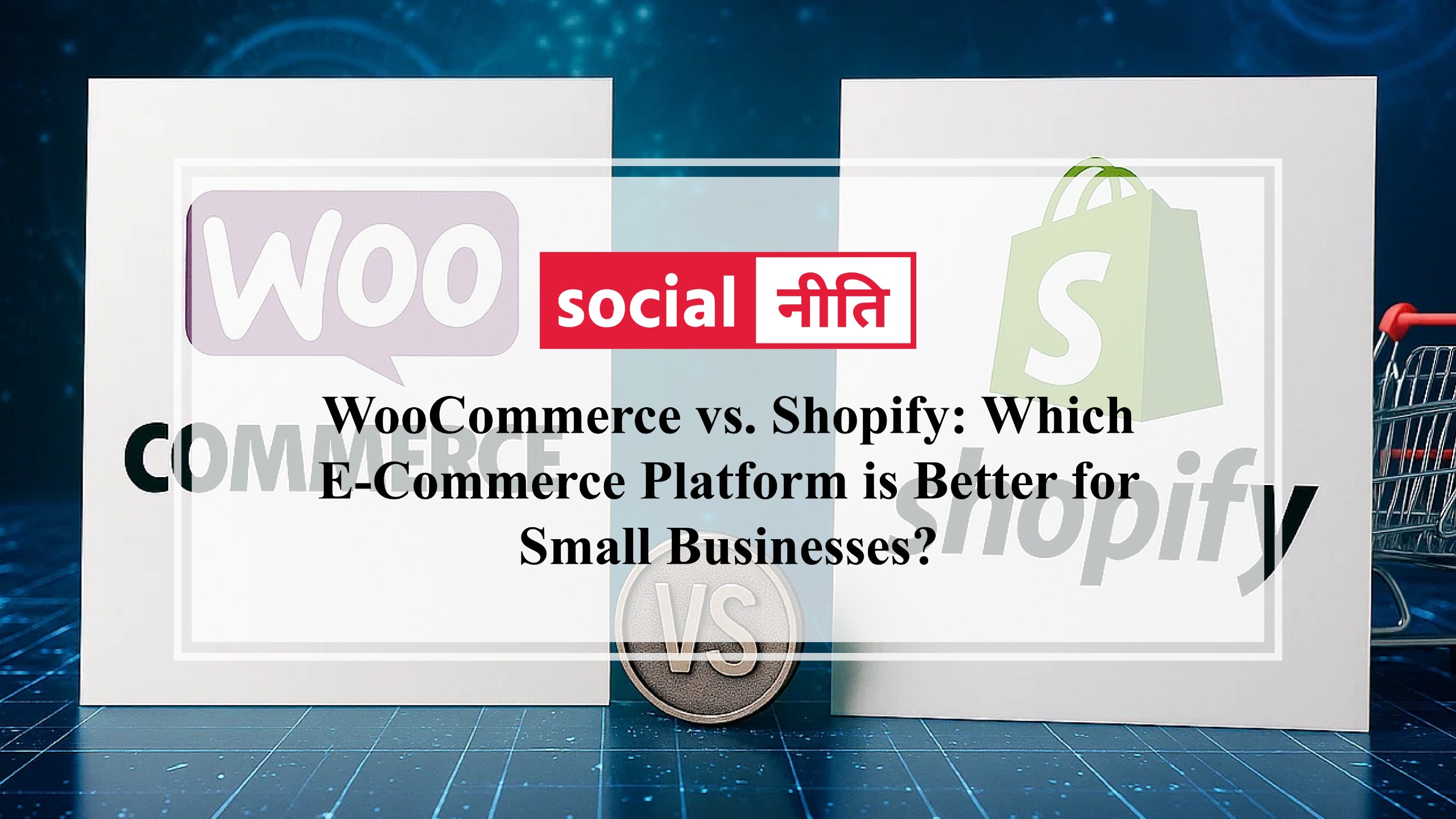When starting your online business, choosing the right platform is a pivotal decision. Among the top choices, WooCommerce and Shopify stand out. Both platforms have helped thousands of small businesses establish a solid e-commerce presence. However, the decision between these two depends on your business’s specific needs, technical expertise, and long-term goals.
In this guide, we’ll compare WooCommerce and Shopify to help you decide which platform is better suited for your small business and to provide you with insights on website development services.
WooCommerce vs. Shopify: A Quick Overview
Both platforms provide essential tools to get your store online, but their approaches are very different.
Shopify is an all-in-one, hosted platform designed for simplicity and ease of use. It takes care of the technical aspects such as hosting, security, and maintenance, making it ideal for beginners or businesses that prefer a streamlined experience. Shopify website development services ensure you have a hassle-free setup, allowing you to focus on your business growth.
WooCommerce, on the other hand, is an open-source plugin for WordPress, giving you complete control over customization. While it offers immense flexibility, it requires more technical knowledge to manage hosting, security, and updates. If you are looking for website development, WooCommerce may be a great option for building a highly customizable e-commerce site.
1. Ease of Use: Shopify for Beginners, WooCommerce for WordPress Users
Shopify stands out in terms of ease of use. It is designed to be beginner-friendly, making it ideal for small business owners who want to focus on selling without getting bogged down by technical tasks. Shopify’s user interface is simple, intuitive, and guides you step-by-step through the setup process. From adding products to configuring payments, Shopify makes it easy to launch your store quickly.
In contrast, WooCommerce is more suited for those who are already familiar with WordPress. It requires you to set up your own hosting, install WordPress, and configure the plugin. If you’re a WordPress user, it integrates seamlessly with your existing site. However, for newcomers, this process can be overwhelming and time-consuming.
2. Customization: WooCommerce Offers Unlimited Flexibility
When it comes to customization, WooCommerce is the clear winner. Since it’s built on WordPress, it allows for deep customization. You can access and modify the underlying code, install custom themes, and add features through plugins. If you have coding skills or are working with a developer, WooCommerce gives you the flexibility to create a completely unique online store with the help of website development services.
Shopify, while offering a variety of themes and apps, is more restricted in terms of deep customization. You can make visual adjustments and add features through apps, but you’re limited by Shopify’s infrastructure. This might be sufficient for most businesses, but for those looking for extensive personalization, WooCommerce is a better choice.
3. Pricing: Shopify’s Predictable Monthly Fees vs. WooCommerce’s Variable Costs
Pricing is often a deciding factor for small business owners. WooCommerce itself is free to use, but you’ll need to pay for domain registration, hosting, and potentially premium themes and plugins. The costs can vary depending on your choices, but initial setup can be affordable. However, as your store grows, additional costs for advanced features and premium services can add up.
On the other hand, Shopify operates on a subscription-based model, with pricing starting at $29/month for the Basic plan. Shopify includes hosting, security, and customer support in its price, which can simplify budgeting. However, if you use third-party payment gateways or add apps from the Shopify App Store, additional fees may apply.
4. Payment Gateways: Flexibility vs. Convenience
For businesses in India, payment gateway integration is crucial. WooCommerce offers flexibility by allowing integration with almost any payment gateway, including popular Indian providers like Razorpay and PayU. While this flexibility is an advantage, it also means you are responsible for the setup and ensuring everything works smoothly.
Shopify, on the other hand, integrates with Shopify Payments, which simplifies the process. However, if you use third-party gateways, Shopify charges additional transaction fees. The platform supports major Indian gateways like Razorpay and also offers multi-currency options for international sales.
5. Support: Shopify’s 24/7 Assistance vs. WooCommerce’s Community-Based Help
Support is another critical factor for small businesses. Shopify offers 24/7 customer support via live chat, email, and phone. This round-the-clock service ensures that help is always available whenever you encounter issues, making it ideal for beginners or business owners who prefer a hands-off approach to technical challenges.
WooCommerce, being open-source, relies on community forums and documentation for support. While there is a wealth of online resources, it may not be as straightforward or fast as Shopify’s dedicated support.
6. Security: Shopify Handles It, WooCommerce Requires Extra Effort
When it comes to security, Shopify provides an edge because it handles security measures for you. Each Shopify store comes with a built-in SSL certificate, which ensures that customer data is encrypted during transactions. Shopify is also PCI DSS compliant, which means it adheres to the highest standards for payment security.
In contrast, WooCommerce requires you to handle security. You’ll need to purchase an SSL certificate from your hosting provider and ensure that your website is regularly updated to avoid vulnerabilities. While this provides more control, it also comes with more responsibility.
7. Scaling: Shopify’s Ease of Expansion vs. WooCommerce’s Customizable Growth
Both platforms allow you to scale your business, but the ease of scaling differs.
Shopify makes it easier to scale your business thanks to its managed infrastructure. As your store grows, Shopify can handle increased traffic and sales without requiring you to worry about hosting or performance issues. You can upgrade your plan as needed to unlock advanced features.
WooCommerce offers great flexibility, allowing you to grow your store at your own pace. However, scaling may require adding more plugins, upgrading hosting, and managing performance on your own. While WooCommerce can handle high traffic, it demands more technical expertise for scaling.
8. SEO: WooCommerce’s Control vs. Shopify’s Simplicity
Both platforms offer strong SEO features, but WooCommerce takes the lead in terms of control. Since it’s built on WordPress, WooCommerce benefits from the SEO capabilities of WordPress, including plugins like Yoast SEO, which help optimize your store for search engines. You can customize everything from URL structures to meta tags and alt text, giving you granular control over your SEO strategy.
Shopify provides built-in SEO tools and apps that simplify the process, but it doesn’t offer the same level of control as WooCommerce. If SEO is a priority and you’re willing to invest time in learning the nuances of optimization, WooCommerce is the better choice.
9. Marketing: Shopify’s Built-In Tools vs. WooCommerce’s Extensive Plugins
When it comes to marketing, both platforms offer tools to help you drive traffic and sales. Shopify has several built-in marketing features, such as email marketing, discount codes, and integration with social media. For more advanced marketing needs, Shopify’s App Store has a vast range of third-party apps.
WooCommerce offers marketing plugins like Mailchimp and Google Analytics for tracking and promoting your store. WooCommerce’s integration with WordPress also allows for easier content marketing through blogs and posts, helping you boost your SEO efforts and engage customers.
10. Final Verdict: Which is Better for Your Small Business?
Both WooCommerce and Shopify offer unique advantages, and the right choice depends on your business’s needs and technical capabilities.
Choose Shopify website development services if you prefer an easy-to-use, all-in-one platform with 24/7 support, built-in security, and simple scalability. It’s ideal for small business owners who want to focus on selling without worrying about technical details.
Choose WooCommerce if you’re comfortable with WordPress and want complete control over your store’s customization. It’s perfect for businesses that need flexibility, advanced SEO, and the freedom to scale as needed.
Both platforms provide excellent opportunities for growth and success. Consider your long-term goals, technical comfort level, and budget when making the final decision.
Conclusion: Making the Right Choice for Your Small Business
Choosing between WooCommerce and Shopify is not a one-size-fits-all decision; it largely depends on the specific needs of your small business, your technical expertise, and the long-term goals you have in mind. Both platforms offer distinct advantages that can help you grow your eCommerce store, but understanding the differences will empower you to make a more informed choice.
If you’re a small business owner looking for ease of use, scalability, and a hassle-free experience, Shopify website development services are a great choice. It simplifies the technical side, allowing you to focus on what matters most—growing your business.
However, if you need full control, want to leverage advanced customization, and are familiar with WordPress, WooCommerce can offer greater flexibility and customization options to match your exact business requirements.
At Social Neeti, we understand that the right platform is key to your business’s success. Whether you need assistance with setting up your eCommerce store, social media marketing, performance marketing, or SEO, our team is here to help you build a strong digital presence and reach your target audience effectively. Let us help you unlock the full potential of your online business with website development services.
Frequently Asked Questions (FAQs)
Yes, you can migrate your store between the platforms, but it can be complex. You can use tools like CSV file exports, apps, or hire a professional to handle the migration.
Both platforms support Indian payment systems. WooCommerce offers flexibility with Indian gateways like Razorpay and PayU, while Shopify integrates well with Razorpay and supports Shopify Payments for easier transactions.
Shopify is better for seamless scalability thanks to its managed infrastructure and easy upgrade options. WooCommerce can also scale, but it requires more technical management, especially as you grow.






